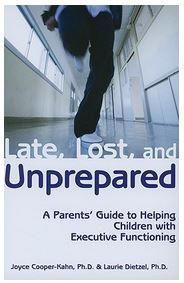Book Review: Late, Lost and Unprepared
Book by: Joyce Cooper-Kahn, PhD and Laurie Dietzel, PhD
Book Review by: Rachel Jones, CCC-SLP

I am child number 3 out of four children, and both of my brothers, in their own way, struggle with executive functioning. My older brother (we’ll call him Matt) is 30, married, working, and a fully functioning adult. When he was growing up, executive functioning wasn’t quite yet a “thing”, and if it was, my parents in small town Midwest didn’t know it existed. That all changed when my younger brother, currently a senior in high school (we’ll call him Dan), was diagnosed with ADHD this spring. My parents always said from the time Dan was born, that he and Matt were practically identical. Now, Matt doesn’t have a diagnosis, but has identical difficulties to Dan.
I really like this book, on a couple different levels. It’s written towards parents so if you’re looking for in-depth therapy strategies, steps, and procedures, this isn’t what you want. It is what you want if you’re looking for practicality, an easy read, and concise information. The book is split up into two sections-“What you need to know” and “What you can do about it”. (I mean, how simplistic is that?) I really appreciate that the authors give a good explanation of executive functioning without an excess of clinical-eese. They make the point a few times initially that you can’t understand how to help if you don’t understand what you’re helping. The second section is put together in a way that each chapter tackles a different issue. This works great for a busy teacher, parent, or therapist who says “My kiddo really struggles with_______”. The authors tackle topics like impulsivity, transitioning, initiation, and organization. Each chapter contains a good amount of sub-topics, ranging from low to high functioning areas. To make for an even faster synopsis, small sections of these chapters have bullet lists of how to help for each area. A “Final Thoughts” section at the end of each chapter provides even more summary.
There were a lot of small touches that I thought were very helpful. I appreciated especially the in-depth description of testing presented in the first section. I feel like it’s a great explanation that helps parents be more prepared and educated when and if they choose to have their child tested. The suggestions and approaches listed under each area in the second section are practical and easy enough to implement. While these suggestions are by no means presented as a one size fits all, nor as a “cure-all”, they aren’t so impossible a parent or teacher couldn’t easily implement them. The authors also go into detail about unique situations that I haven’t seen covered many places. For instance, strategies for children who interrupt so they don’t forget what they have to say and strategies for a child who is genuinely surprised when she gets in trouble for misbehavior were two areas I was impressed by. Naturally, as an SLP I was drawn to the sections on language skills first.
Overall, this book was a great refresher on executive functioning and our role as helpers. The book is easy to understand and straight-forward, easy and approachable enough for parents, but still useful for professionals. My big take-away from the book was a reminder that not all students with executive functioning difficulties are students with some kind of diagnosis. This, along with the tools and ideas included in the chapters has not only changed the way I treat my brothers but the way I work with each of the students on my caseload. I’m glad to have this book as a go-to for me as a therapist and as a tool to refer parents looking for guidance to. As is with any reference book on any kind of area we treat as professionals, it’s important to remember that not every approach works for every child, and no two children are alike. This guide is a great start however, and if nothing else, a great resource to help generate questions, ideas, and intervention plans to help this special population be as successful as they can be.
Order this Book on Amazon Through our Affiliate Link
About the Reviewer: Rachel Jones, CCC-SLP
Rachel is a first year SLP in 3 public schools in Indiana when she’s not blogging, drinking coffee, or pretending she can bake. She can be reached at letstalkaboutspeechtherapy@
PediaStaff is Hiring!
All JobsPediaStaff hires pediatric and school-based professionals nationwide for contract assignments of 2 to 12 months. We also help clinics, hospitals, schools, and home health agencies to find and hire these professionals directly. We work with Speech-Language Pathologists, Occupational and Physical Therapists, School Psychologists, and others in pediatric therapy and education.
